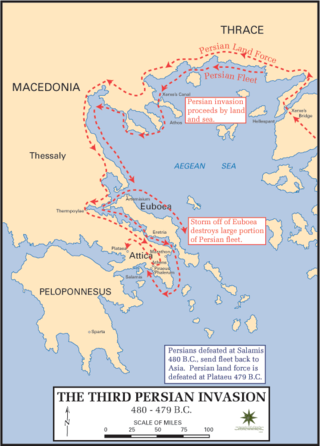
The Peloponnesian War was an ancient Greek war fought between Athens and Sparta and their respective allies for the hegemony of the Greek world. The war remained undecided for a long time, until the decisive intervention of the Persian Empire in support of Sparta. Led by Lysander, the Spartan fleet, built with Persian subsidies, finally defeated Athens and started a period of Spartan hegemony over Greece.

The 5th century BC started the first day of 500 BC and ended the last day of 401 BC.
Year 404 BC was a year of the pre-Julian Roman calendar. At the time, it was known as the Year of the Tribunate of Volusus, Cossus, Fidenas, Ambustus, Maluginensis and Rutilus. The denomination 404 BC for this year has been used since the early medieval period, when the Anno Domini calendar era became the prevalent method in Europe for naming years.
This article concerns the period 459 BC – 450 BC.
This article concerns the period 449 BC – 440 BC.

This article concerns the period 409 BC – 400 BC.

Year 480 BC was a year of the pre-Julian Roman calendar. At the time, it was known as the Year of the Consulship of Vibulanus and Cincinnatus. The denomination 480 BC for this year has been used since the early medieval period, when the Anno Domini calendar era became the prevalent method in Europe for naming years.
This article concerns the period 429 BC – 420 BC.
This decade witnessed the continuing decline of the Achaemenid Empire, fierce warfare amongst the Greek city-states during the Peloponnesian War, the ongoing Warring States period in Zhou dynasty China, and the closing years of the Olmec civilization in modern-day Mexico.
Year 405 BC was a year of the pre-Julian Roman calendar. At the time, it was known as the Year of the Tribunate of Barbatus, Capitolinus, Cincinnatus, Medullinus, Iullus and Mamercinus. The denomination 405 BC for this year has been used since the early medieval period, when the Anno Domini calendar era became the prevalent method in Europe for naming years.

Thrasybulus was an Athenian general and democratic leader. In 411 BC, in the wake of an oligarchic coup at Athens, the pro-democracy sailors at Samos elected him as a general, making him a primary leader of the ultimately successful democratic resistance to the coup. As general, he was responsible for recalling the controversial nobleman Alcibiades from exile, and the two worked together extensively over the next several years. In 411 and 410, Thrasybulus was in command along with Alcibiades and others at several critical Athenian naval victories.

Alcibiades was an Athenian statesman and general. The last of the Alcmaeonidae, he played a major role in the second half of the Peloponnesian War as a strategic advisor, military commander, and politician, but subsequently fell from prominence.

Year 450 BC was a year of the pre-Julian Roman calendar. At the time, it was known as the Second year of the decemviri. The denomination 450 BC for this year has been used since the early medieval period, when the Anno Domini calendar era became the prevalent method in Europe for naming years.
Year 411 BC was a year of the pre-Julian Roman calendar. At the time, it was known as the Year of the Consulship of Mugillanus and Rutilus. The denomination 411 BC for this year has been used since the early medieval period, when the Anno Domini calendar era became the prevalent method in Europe for naming years.
Year 425 BC was a year of the pre-Julian Roman calendar. At the time, it was known as the Year of the Tribunate of Atratinus, Medullinus, Cincinnatus and Barbatus. The denomination 425 BC for this year has been used since the early medieval period, when the Anno Domini calendar era became the prevalent method in Europe for naming years.

Theramenes was an Athenian military leader and statesman, prominent in the final decade of the Peloponnesian War. He was active during the two periods of oligarchic government at Athens, the 400 and later the Thirty Tyrants, as well as in the trial of the generals who had commanded at Arginusae in 406 BC. A moderate oligarch, he often found himself caught between the democrats on the one hand and the extremist oligarchs on the other. Successful in replacing a narrow oligarchy with a broader one in 411 BC, he failed to achieve the same end in 404 BC, and was executed by the extremists whose policies he had opposed.
The Battle of Cyzicus took place in May or June 410 BC during the Peloponnesian War. During the battle, an Athenian fleet commanded by Alcibiades, Thrasybulus, and Theramenes routed and destroyed a Spartan fleet commanded by Mindarus. The victory allowed Athens to recover control over a number of cities in the Hellespont over the next year. In the wake of their defeat, the Spartans made a peace offer, which the Athenians rejected.
The Battle of Notium in 406 BC was a Spartan naval victory in the Peloponnesian War. Prior to the battle, the Athenian commander, Alcibiades, left his helmsman, Antiochus, in command of the Athenian fleet, which was blockading the Spartan fleet in Ephesus. In violation of his orders, Antiochus attempted to draw the Spartans into battle by tempting them with a small decoy force. His strategy backfired, and the Spartans under Lysander scored a small but symbolically significant victory over the Athenian fleet. This victory resulted in the downfall of Alcibiades, and established Lysander as a commander who could defeat the Athenians at sea.
Thrasyllus was an Athenian strategos (general) and statesman who rose to prominence in the later years of the Peloponnesian War. First appearing in Athenian politics in 410 BC, in the wake of the Athenian coup of 411 BC, he played a role in organizing democratic resistance in an Athenian fleet at Samos. There, he was elected strategos by the sailors and soldiers of the fleet, and held the position until he was controversially executed several years later after the Battle of Arginusae.
Mindarus was a Spartan navarch who commanded the Peloponnesian fleet in 411 and 410 BC, during the Peloponnesian War. Successful in shifting the theatre of war into the Hellespont, he then experienced a string of defeats; in the third and final of these, he was killed and the entire Peloponnesian fleet was captured or destroyed.







